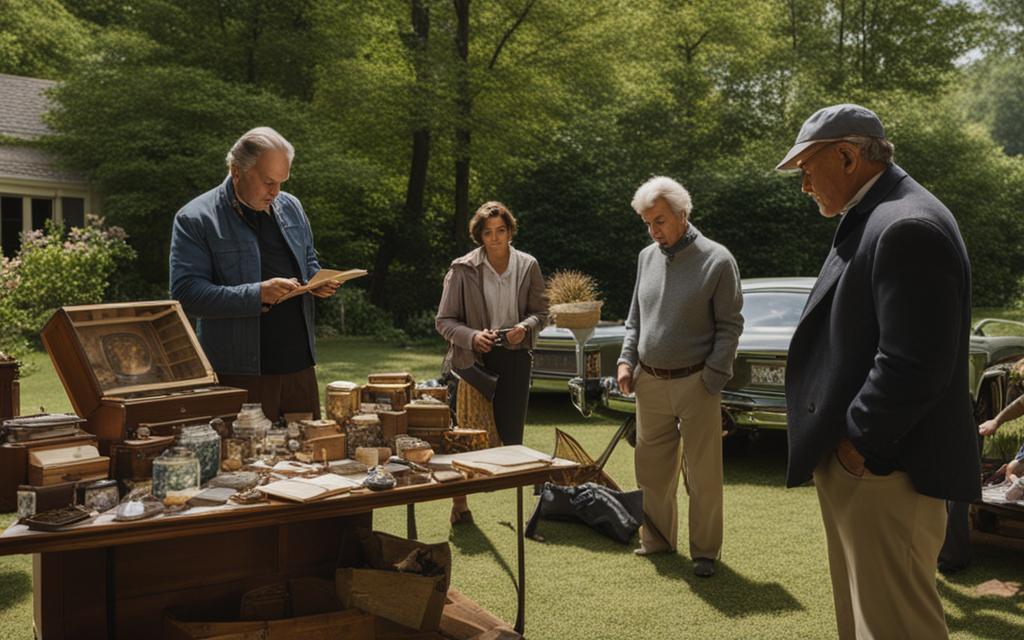Estate Sale Etiquette: The Do’s and Don’ts of Estate Sale Shopping

Introduction to Estate Sale Etiquette
Estate sale etiquette is an essential aspect of attending these unique events. Proper estate sale etiquette involves following a set of guidelines and rules that ensure a respectful and pleasant experience for both buyers and sellers.
By adhering to these etiquette rules, you can contribute to the smooth operation of the sale and create a positive atmosphere for everyone involved.
Key Takeaways about Estate Sale Etiquette
- Understanding and practicing estate sale etiquette is crucial for a successful shopping experience.
- Estate sale etiquette involves following guidelines and rules to maintain a respectful environment.
- Adhering to proper etiquette contributes to the smooth operation of the sale.
- Estate sale etiquette creates a positive atmosphere for both buyers and sellers.
By incorporating these key takeaways into your estate sale shopping, you can navigate the event with ease and make the most out of your buying experience.
Table of Contents
What is an estate sale and how does it function?

To fully grasp estate sale etiquette, it is crucial to have a clear understanding of what exactly estate sales are and how they operate. An estate sale is a public sale that offers the personal property found within a household for purchase.
Typically, these sales are held after a significant life event such as a death or a major life change that prompts the homeowners to quickly vacate the premises. Professional estate sale companies are responsible for organizing and pricing the items for sale, ensuring a smooth process for buyers and sellers alike.
During an estate sale, each item is typically assigned a price tag, clearly indicating its value and availability for purchase. This tagging system allows attendees to easily identify the items they are interested in and makes the purchasing process more efficient. By understanding the inner workings of estate sales, including the role of estate sale companies and the concept of ‘tagging’, shoppers can navigate the experience with ease and make the most of their buying opportunities.
What are the basic etiquette rules for estate sale shopping?

Estate sale shopping can be an exciting and rewarding experience, but it’s important to follow a few basic etiquette rules to ensure a positive and respectful environment for everyone involved.
Let’s break down the essence of estate sale etiquette and understand why it matters.
Breaking down the essence of estate sale etiquette
Estate sale etiquette encompasses a set of guidelines and behaviors that attendees should observe while shopping at estate sales. These rules are designed to promote fairness, respect, and a pleasant experience for both buyers and sellers. By adhering to these etiquette rules, you can contribute to a smooth and enjoyable shopping environment.
Why etiquette matters at an estate sale
Etiquette is of paramount importance at estate sales because it sets the tone for respectful and considerate behavior. Estate sales often involve personal belongings of the deceased or individuals going through significant life transitions. Respecting these items and the context surrounding the sale is essential to maintain the dignity and integrity of the process.
Don’t break or damage anything: The unwritten rules
When attending an estate sale, one of the cardinal rules is to exercise care and caution around the items for sale. Avoid handling items roughly, and always ask for assistance if you need help with larger or delicate items. Remember, these belongings hold sentimental or historical value, and damaging them would be disrespectful and inappropriate.
Understanding the ‘do not enter’ signs at an estate sale
‘Do not enter’ signs are typically posted in areas of the estate that are off-limits to shoppers. Respect these signs and refrain from entering restricted areas as they often signify spaces that are private or intended for the family. Following these signs demonstrates your understanding of boundaries and your respect for the privacy and wishes of the estate sale organizers.
The importance of respecting the location as someone’s home
It is crucial to remember that an estate sale takes place in someone’s former home or living space. Treat the location with respect and care, just as you would if you were a guest in someone’s house. Avoid leaving trash or making a mess, and be mindful of the property as you move throughout the sale.
How do the opening days of an estate sale work?

The opening days of an estate sale can be quite an exciting and frenzied affair. Shoppers eagerly anticipate the chance to explore the treasures that await them inside the estate. Understanding how these opening days function is essential for making the most out of your estate sale shopping experience.
The varied strategies shoppers employ as the sale opens
As the doors of an estate sale open, shoppers employ various strategies to gain an advantage and secure the best finds. Some avid estate sale enthusiasts arrive early to be at the front of the line, allowing them first access to the items on sale. Others prefer to wait until later in the day when prices may be discounted. Each shopper has their own unique approach, whether it’s diving straight into the chaos or taking a calculated and patient approach.
The influence of the opening day upon the overall estate sale shopping
The opening day sets the tone for the entire estate sale. It is during this time that the majority of shoppers are present, creating a bustling atmosphere where competition for desirable items can be fierce. The energy and excitement of opening day can significantly impact the overall shopping experience, from the availability of items to the pricing and bargaining dynamics.
The significance of the line and the concept of ‘cut in line’
Waiting in line is a common occurrence during estate sales, and it is important to understand the etiquette surrounding this process. Shoppers are expected to respect the order in which they arrived and refrain from attempting to ‘cut in line’. Ethical behavior includes joining the line behind those who arrived before you and patiently waiting for your turn to enter the estate sale premises.
What to do when the door opens for the sale
When the door finally opens for the estate sale, it is crucial to enter calmly and respectfully. Avoid rushing or pushing past other shoppers, as this can lead to unnecessary tension and conflicts. Take a moment to familiarize yourself with the layout of the sale and start exploring the items at a comfortable pace.
Dealing with the prices and bargains on the opening day of the sale
Pricing and bargaining on the opening day of an estate sale can vary depending on the company hosting the sale. Some estate sale companies may have fixed prices for items, while others may be open to negotiation, especially as the sale progresses. Be prepared to evaluate the prices and bargains available, and if negotiating is allowed, approach it tactfully and respectfully.
Opening day of an estate sale presents both excitement and challenges. It’s a time when shoppers employ unique strategies, the overall shopping experience is influenced, waiting in line has significance, door-opening etiquette is important, and prices and bargains are to be navigated. By understanding the dynamics of opening days, estate sale shoppers can make the most of their experience and uncover hidden treasures.
How to shop effectively at an estate sale?

Shopping effectively at an estate sale is crucial to finding the best items and ensuring a smooth buying experience. Here are some tips and tricks to help you shop efficiently:
Tips and Tricks for Efficient Estate Sale Shopping
To make the most out of your estate sale shopping experience, consider the following:
- Arrive Early: Estate sales can get crowded, so arriving early gives you a better chance of finding unique items before they’re gone.
- Come Prepared: Bring cash, as it is the most common form of payment at estate sales. Additionally, bring a tote bag or cart to carry your purchases.
- Do Your Research: Look for estate sales in your area and check their websites or listings for previews or item photos. This can help you prioritize which sales to attend and plan your route.
- Bring a Measuring Tape: If you’re looking for furniture or larger items, having a measuring tape on hand will help you determine if they will fit in your space.
- Ask Questions: Don’t hesitate to ask the estate sale company staff or the homeowner any questions you may have about an item’s history, condition, or price.
How to Use ‘Sold’ Tags to Your Advantage
‘Sold’ tags are a valuable tool for estate sale shoppers. When you find an item you’re interested in, place a ‘sold’ tag on it to let others know that you intend to purchase it. This helps prevent confusion and ensures that you have a fair chance to buy the desired item. Remember to communicate with the estate sale staff to complete your purchase and remove the ‘sold’ tag once the transaction is finalized.
The Role of Cashiers at an Estate Sale
Cashiers play a crucial role in the estate sale process. They handle the financial transactions, collect payment from buyers, and provide receipts. It’s important to be patient and respectful when interacting with cashiers, especially during busy times. Make sure to have your cash ready and follow any instructions provided by the estate sale company to ensure a smooth checkout process.
Why You Don’t Have to Carry Anything While You’re Shopping
One of the convenient aspects of estate sale shopping is that you don’t have to carry your purchases while browsing. Most estate sales provide holding areas where you can leave your items until you’re ready to check out. This allows you to explore the sale comfortably without being burdened by carrying heavy or bulky items. Simply inform the staff about your intent to purchase, and they will help secure your items until you’re ready to complete the transaction.
Understanding the Difference Between Auctions and Estate Sales
While auctions and estate sales share similarities, there are important distinctions between the two:
| Auctions | Estate Sales |
|---|---|
| Items are sold to the highest bidder. | Items are priced and sold at set prices. |
| Bidding and competition can drive up prices. | Prices may be negotiable, especially on later days of the sale. |
| Items are typically sold at a single event. | Estate sales can span multiple days or weekends. |
| The pace can be fast-paced and intense. | Estate sales offer a more relaxed shopping experience. |
Understanding these differences can help you decide which type of sale is better suited to your shopping preferences and goals.
What to expect on the closing day of an estate sale?
The closing day of an estate sale is a pivotal moment for both buyers and sellers. As the sale nears its end, shoppers can take advantage of unique opportunities to secure great deals on valuable items. Let’s explore what you can expect on the closing day of an estate sale.
Comparing the first and last day of the estate sale
It’s important to note the differences between the first day and the final day of an estate sale. While the first day often attracts a larger crowd and offers a wider selection of items, the last day presents its own advantages. As the sale progresses, the estate sale company and the seller may be more motivated to sell remaining items, leading to potential markdowns and bargaining opportunities.
The possibilities and benefits of estate sale shopping on the last day
Shopping on the last day of an estate sale can offer several benefits. Firstly, you can find items at significantly reduced prices as sellers are eager to clear the remaining inventory. Additionally, by shopping on the final day, you have the opportunity to discover hidden gems that might have been overlooked by earlier shoppers. It’s a chance to find unique items and add them to your collection at a fraction of their original price.
How to secure the best deals on the last day of the sale
To secure the best deals on the last day of an estate sale, it’s important to arrive early and be prepared. By getting to the sale early, you increase your chances of finding desirable items before other buyers. Bring cash with you as some estate sales may no longer accept credit cards on the final day. Finally, be ready to negotiate with the estate sale company or seller to secure the best price.
Insight into the final hours: what happens when the sale closes
As the closing hour of the estate sale approaches, the estate sale company and the seller will begin the process of wrapping up the sale. Any remaining items might be further discounted, as the goal is to sell as much as possible before the sale concludes. During the final hours, expect more flexibility in negotiations and potentially even the opportunity to make offers on remaining items.
Understanding the dynamics of leftover items and their disposition
At the end of the estate sale, there may still be leftover items that have not been sold. The disposition of these items will vary depending on the estate sale company or the seller’s preference. They may choose to donate unsold items to charities, arrange for a liquidation company to purchase the remaining inventory, or make other arrangements to clear the space. Understanding the disposition of leftover items can provide insights into the life cycle of an estate sale and what happens after the doors close.
| First Day | Last Day |
|---|---|
| Wide selection of items | Potential markdowns and bargains |
| More competition | Possibility of overlooked treasures |
| Higher prices | Items sold at reduced prices |
| Less flexibility in negotiations | More room for negotiation |
Conclusion
In conclusion, estate sale etiquette is essential for a successful and enjoyable shopping experience. By understanding and following the do’s and don’ts of estate sale shopping, respecting the items and the location, and navigating opening and closing days effectively, you can make the most out of your estate sale shopping adventures.
Remember that estate sales provide a unique opportunity to find valuable and unique items at affordable prices. By practicing proper etiquette, you contribute to maintaining a respectful and positive atmosphere for both buyers and sellers. Respect the items for sale, understand the rules and guidelines set by the estate sale companies, and always demonstrate courtesy and consideration towards fellow shoppers.
Whether you’re a seasoned estate sale enthusiast or a first-time shopper, following these etiquette rules will enhance your experience and increase your chances of finding hidden gems. So, next time you attend an estate sale, keep these etiquette tips in mind and enjoy your treasure-hunting adventure!
FAQs
Here are some frequently asked questions about estate sale etiquette and shopping, along with helpful answers to address common queries:
Q: What is the best way to find estate sales in my area?
A: There are several ways to find estate sales near you. You can check local newspapers, online classifieds, and estate sale listing websites. Additionally, joining estate sale enthusiast groups on social media platforms can provide you with insider information about upcoming sales in your area.
Q: Is it okay to negotiate prices at an estate sale?
A: While some estate sales may allow price negotiations, it is important to approach this with respect and courtesy. If you’re interested in an item but feel the price is too high, politely inquire if there is room for negotiation. However, keep in mind that estate sale companies have already priced items based on their expertise, so not all prices may be negotiable. It’s always best to ask if negotiation is allowed before assuming.
Q: What should I bring with me when attending an estate sale?
A: It is helpful to bring cash as most estate sales operate on a cash-only basis. It’s also a good idea to bring a reusable shopping bag or box to carry your purchases, as well as any necessary tools or equipment if you plan on purchasing larger items that require disassembly or transport.
Q: Are children allowed at estate sales?
A: While policies may vary, it is generally recommended to avoid bringing young children to estate sales. Estate sales can be crowded and there may be fragile or valuable items that could be easily damaged. It’s best to check with the estate sale company beforehand to determine their policy on children attending the sale.
By following these tips and understanding the behavior rules of estate sale shopping, you can navigate these sales with confidence and make the most out of your experience.







